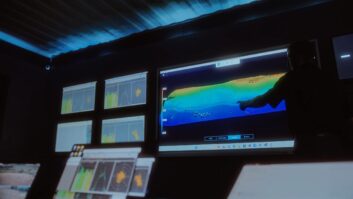Deutsche Telekom has launched VideoMeet, a new Cloud-based service designed to simplify interoperability between different videoconferencing technologies. The arrival in the videoconferencing market of Microsoft, with its purchase of Skype, and Cisco, with its purchase of Tandberg, has reduced industry momentum towards common standards. “We’ve gone backwards in the interoperability stakes in the past two or three years,” said Ian Vickerage, managing director of distributor Imago. VideoMeet is designed to tackle this issue. “As far as we can tell – and we’ve tried quite a few other pretenders – it is the only service that can do this: it can work with Skype, Polycom, Cisco, Tandberg, Google, Lync… they can all work and talk to each other.” At the heart of the system is Cloud-based server technology developed by Californian company Blue Jeans, to which Deutsche Telekom has added functionality – such as firewall traversal and the ability to work with ISDN. English, French and German language versions are available. Using VideoMeet can be thought of as analogous to organising and running a physical meeting. The organiser logs onto the system to set up the meeting, which sends an email to the invitees. Participants can decide which device to use to connect by clicking the relevant link within the email. VideoMeet has a maximum ‘room size’ of 25 connections – video endpoints or phones. Two annual pricing options are available: users can either pay for unlimited use of a fixed number of meeting rooms; or on a per-minute basis for an unlimited number of meeting rooms. VideoMeet does away with the need for multipoint control units (MCUs) to bridge videoconferencing calls. According to Bob Rickwood, a consultant with DT, the average enterprise solution would be a 25-port MCU, with a purchase cost of £125,000 and monthly maintenance costs of around £1,500. By contrast, four VideoMeet meeting rooms cost £1,300 per month. Both men believe that VideoMeet addresses many of the issues affecting the video communications market today, including mixed videoconferencing technologies within enterprises and the growth of ‘bring your own device’. It also allows for flexibility in the technologies used: if someone is unexpectedly away from their office, they can take part in a meeting from wherever they are via a mobile device. DT and Imago are currently seeking reseller partners among, for example, AV and IT integrators. As the service is Cloud-based, there is no equipment to install. However, Vickerage believes that VideoMeet will stimulate the videoconferencing installation market. “The cost of bridges is a massive barrier to the adoption and implementation of endpoints. In encouraging the adoption of VideoMeet, our view is that we’ll see much more proliferation of endpoints, because the service is better,” he said. www.videomeet.co.ukwww.imagogroupplc.com
VideoMeet promises simpler videoconferencing
A new Cloud-based videoconferencing bridging service promises simpler video communications and may stimulate the growth of video communications, according to its suppliers.







